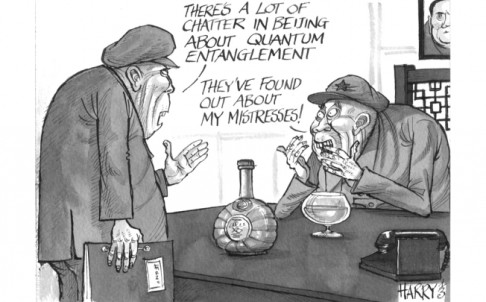
Quantum communications system was used at Party Congress in Beijing
Revelation that secret communications system was used at the party congress last autumn shows high level of security concern in Beijing

Beijing was so worried about cyberspies during last autumn's party congress that it turned to a secret, state-of-the-art telecommunications network to handle sensitive information.
Use of the next-generation quantum encryption technology at the once-in-a-decade leadership transition was revealed in a passing remark reported last week in People's Daily.
Chinese scientists are well aware of how vulnerable data can be when it is being transmitted, describing it as the weakest link in their security.
Revelations by whistle-blower Edward Snowden that the US is targeting "network backbones" - through which huge amounts of data are transmitted - confirmed their fears.
Now all major countries are pouring resources into developing large-scale quantum networks. China came late into the game, but it is now the subject of a major national project.
And Beijing plans to launch the world's first quantum communications satellite in 2016, a top mainland researcher told the South China Morning Post.
In quantum mechanics, connections are made between two points when photons of light become entangled. This creates an encryption key that can be used to send the message through normal channels.
But if somebody tries to spy on that quantum communication, the connection is so fragile it disrupts the entanglement - letting both the sender and the receiver of the message know someone is snooping.
For years, Beijing has prohibited key government institutes and agencies from handling sensitive information by connection to the global internet. The enclosed systems include the China Golden Bridge Network, used by government institutes, and several military backbone networks.
They run on homegrown operating systems and on computers with core chips designed and developed by Chinese companies. Data is heavily encrypted to ensure security.
But even such measures may not go far enough. Data can be intercepted during transmission, while even the best encryption can be deciphered by talented mathematicians equipped with supercomputers.
Scientists involved in the quantum programme believe Snowden's revelations will "definitely speed up" China's move to quantum communications.
Even before the Snowden incident, Beijing leaders had used prototype quantum networks on critical occasions.
The latest example was during the party congress last year, which saw Xi Jinping succeed Hu Jintao as party chief. In the days leading up to the congress, intense horse-trading and negotiations among political leaders required an absolutely safe channel for communication.
But scientists still have one serious hurdle to overcome before they can apply the technology on a larger scale.
Professor Bao Xiaohui , a quantum information expert with the National Laboratory for Physical Sciences at the Microscale in Hefei , said most quantum communications networks in use today can operate over a maximum distance of only about 50 kilometres.
Bao's laboratory is leading the research of quantum communications on the mainland and now holds several records for the distance covered.
In traditional telecommunications, digital information is carried by electrons or photons in waves that can be amplified to achieve long-distance communication. But in quantum communication, the information is carried in the quantum state of each photon. The quantum state cannot be amplified once the photon has left the sender - much as a bullet cannot be given more spin after it has left the barrel of a gun.
After a certain distance, the quantum state might weaken or disappear. While existing fibre-optic cable networks are ideal for conventional, "wave-like" communications, they are inefficient for carrying individual photons over long distances.
To overcome this limitation, scientists have come up with the idea of quantum repeater. When a photon reaches the repeater it activates some sleeping atoms.
In a delicate operation, scientists can force these atoms back to sleep and in the process emit a new photon carrying the same quantum state.
But the operation is very difficult, Bao says. The energised atoms are quite unstable and can easily be affected by external elements such as the earth's magnetic field and lose their quantum state.
To achieve long-distance quantum communication, Bao's team is building what is expected to be the world's first quantum communications satellite.
Because photons can travel long distances in the open, especially in space, they could carry the quantum information between two locations thousands of kilometres apart with uplink and downlink to the satellite.
Detailed information on the satellite is classified, but Bao says it will look completely different from communications satellites today that rely on microwaves.
"It will not have a dish antenna to pick up or beam the signal because the communication would be purely optical," he said. "It will use a lot of mirrors, for sure. To some extent it may look like the Hubble Space Telescope - the difference is that its eyes would be pointing at the earth instead of the far universe."
Bao says the quantum satellite's signals cannot be intercepted. Unlike radio waves that would propagate as they travelled, the photons would aim precisely at a specific receiving station. Any attempted interception would be detected.
But it is difficult to judge when quantum communication will become available for use by ordinary people.
Existing encryption and protection methods are still good enough for the public, Bao says.
Tang Wei , cybersecurity engineer with mainland anti-virus company Rising, says that security technology, no matter how advanced it is, can only be as good as the person handling it.
"No technology is absolutely safe because all technology is used by humans," he said.
"With an insider, you can get into the most heavily guarded system without even touching a keyboard."
